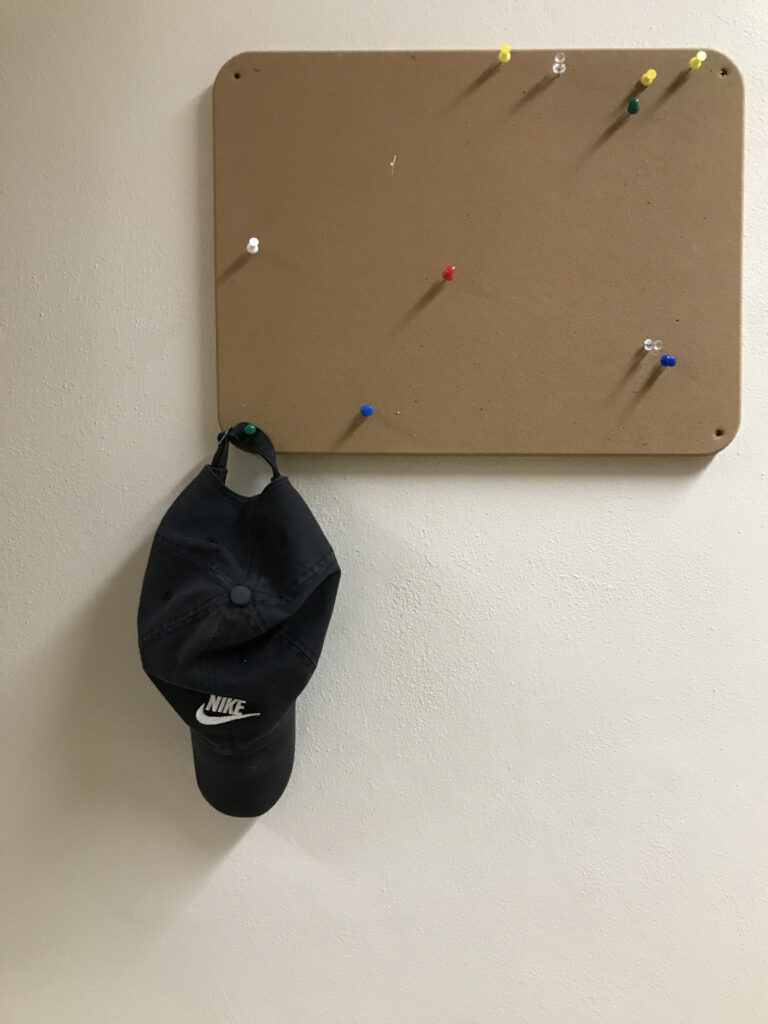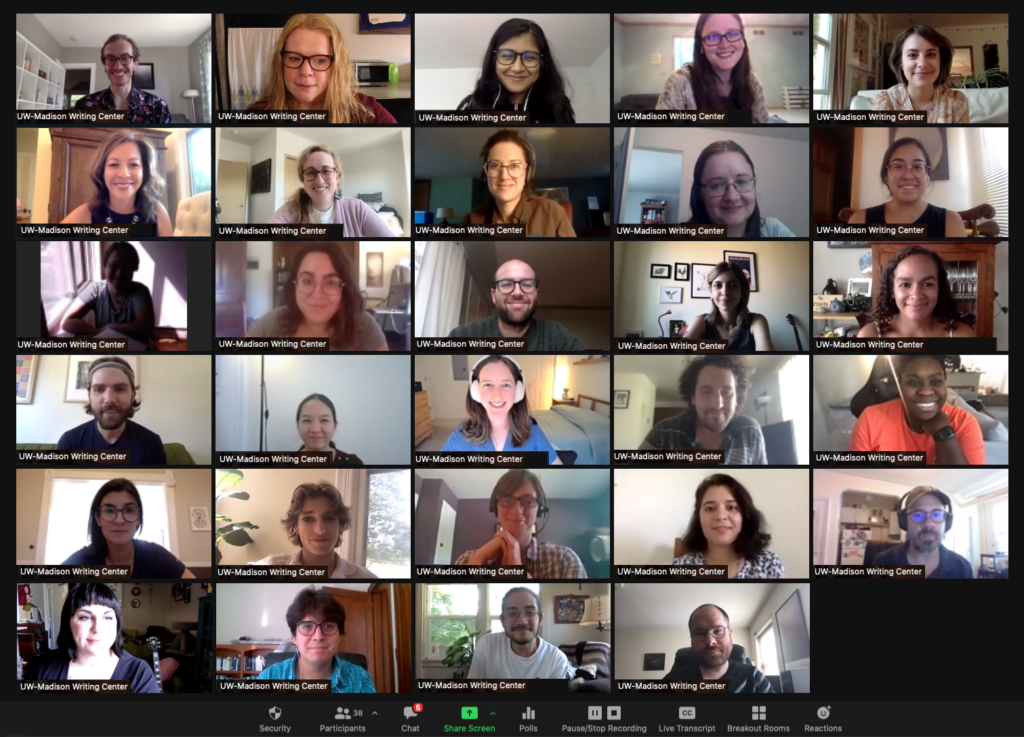Greetings from a new fall semester!
As summer edges its way into fall, we find ourselves returning: not just the return that comes with the cycle of a new academic year but also a return to campus life that continued moving while its physical spaces seemed to remain suspended in time.

The baseball cap left hanging from a thumbtack on the bulletin board 18 months ago remained in place there, still waiting for its person to claim it, while the Writing Center posters in our meeting room overlooking Lake Mendota slumped from their attachments, finding their way to the floor. Yet in the year that we taught from our homes while on Zoom and in WCOnline, among other spaces, first-year students became second-year students, graduate students wrapped up their degrees, and academic progress, well, progressed.
Stepping back into the Writing Center itself feels deeply familiar at the same time it is also newly strange. Pathways worn into our neural circuitry have not entirely grown over, as it turns out, but they must be reawakened in the movement over this threshold.
This fall, we are excited to continue some of the online practices and programs that our writing center debuted in 2020-21 and are also eager to bring back some of the mainstays of our engagement with students, especially our in-person appointments. Below are some highlights of our offerings for Fall 2021:
Services for Students
In-Person Appointments
Writing Center instructors are once again available at our main location in Helen C. White Hall to meet with students, typically from 10 a.m. to 5:30 p.m. We help undergraduate and graduate writers at any stage of the writing process—from choosing a topic to drafting and revising—with a wide range of genres that span the disciplines across our university. Currently enrolled UW-Madison students can set up appointments online, through WCOnline, up to two weeks in advance.
Instructors at our eight satellite locations in residence halls, libraries, and multicultural student centers across campus are also available for in-person meetings with students. Students can sign up for same-day appointments through WCOnline, viewing all of our satellite locations’ availability at once and choosing the location that is best for them. Our instruction at these locations represents our commitment to meeting students where they are. Most satellite appointments take place in the evening, typically between 6:15 and 9:15 p.m.
Virtual Meetings
Virtual Meetings provide synchronous sessions with video, audio, and chat capabilities, along with a shared whiteboard where writers can share their drafts, converse, and collaborate on writing with a Writing Center instructor in real time, much as they would during an in-person meeting.
Written Feedback
Written Feedback provides students with individualized, asynchronous feedback on their writing. Like virtual meetings, Written Feedback appointments take place through WCOnline, with students uploading drafts and any related information (such as the assignment prompt) and writing instructors providing feedback within one business day.
Workshops
This semester, we are offering a full slate of 45 workshops, some of which are fully online and some of which take place in person. These free, non-credit workshops for students, faculty, and staff members cover such topics as Growing Confidence in Your Writing, Writing Personal Statements for Grad School, Getting Your Dissertation Off the Ground, and more.
Writing Groups
Our undergraduate and graduate writing groups offer students the chance to focus on their writing projects within a community of other writers. Writers seek out the accountability and connection that these groups provide. This fall, we are offering registered groups, where the same people attend the group each week, as well as drop-in groups, where participants can choose on a weekly basis whether to participate. We are offering online groups, in-person groups, and hybrid groups that include both in-person and online participants.
Writing Mentorships
Writing Mentorships connect student writers with the same Writing Center instructor through a series of ongoing appointments over the course of the semester. Writing Mentorships are designed to help undergraduate and graduate students make progress on a thesis, dissertation, multiple course papers, or another extended writing project. See this post for an exploration of how both students and Writing Center instructors benefit from these mentorships.
Services for Classroom Instructors
Outreaches and Co-Teaching
Classroom instructors can request a Writing Center instructor to provide a brief introduction to the Writing Center’s services, facilitate an in-class writing workshop, or present on another aspect of academic or professional writing, including what writing might look like in a particular discipline or genre. Outreach instructors also meet with students informally at resource fairs and other campus events to let them know about the services that the Writing Center offers.
Help with Designing Writing Assignments
Our Writing Across the Curriculum program offers consultations to UW-Madison faculty, instructional staff, and teaching assistants. We are eager to help classroom instructors at all levels and in all disciplines think about creative and effective ways to incorporate writing and speaking assignments into their courses. Check out our Online Writing Toolkit and our WAC Sourcebook for some ideas about how to incorporate writing into your courses.
Services for Community Members
Community members who would like support with writing of all genres–resumes, cover letters, application essays, grant proposals, creative writing, and various forms of life writing–can schedule appointments through Madison Writing Assistance (MWA), which offers free, individualized writing support at libraries and neighborhood centers throughout Madison.
Teaching Writers about Writing
Also underway? A return to teaching. Our Writing Fellows have begun English 403, or “Seminar on Tutoring Writing Across the Curriculum,” in which they explore issues that arise in the teaching of writing and learn practical strategies for commenting on student papers and holding conferences with their peers. Similarly, new Writing Center instructors participate in the 9-week “Proseminar in Writing Center Theory and Practice,” which introduces them to writing center work and, more specifically, to the work of our writing center through various frameworks, including accessibility and Universal Design for Learning, linguistic diversity and linguistic justice, and anti-racism.

As we rehang our posters and brush dust from the reception desk, we make ourselves ready not just for reestablishing our physical presence in the space of our writing center and classrooms across campus but also for integrating the knowledge and experiences that we gained while away. As we invite ourselves back into the rooms that are layered with conversations and which spark with points of connection gone dormant, we are building new habits and practices: many of which, like our facility with online spaces, did not exist previously. We move into our responsibilities with a sense of wonder that everything still looks and feels so much like it did before, and yet we recognize that this threshold, like others, offers a feeling of the unknown along with its familiarity.
In all of our spaces, both in person and online, we look forward to continuing to connect, build community, and support writers, wherever they, in turn, find themselves!
Wishing you the best, this semester and always,
Emily Hall and Nancy Linh Karls
Co-Directors of The Writing Center and Writing Across the Curriculum
University of Wisconsin–Madison



Good information about writing skills to start from the beginning again.
Thank you for writing such a valuable blog. Keep writing.
Good information about writing skills to start from the beginning again.
Thank you for writing such a valuable blog. Keep writing.